Bridging Deserts and Mountains: Ambassador Abdula Jarwan Alshamsi on UAE-Nepal Synergy
- Nature Khabar
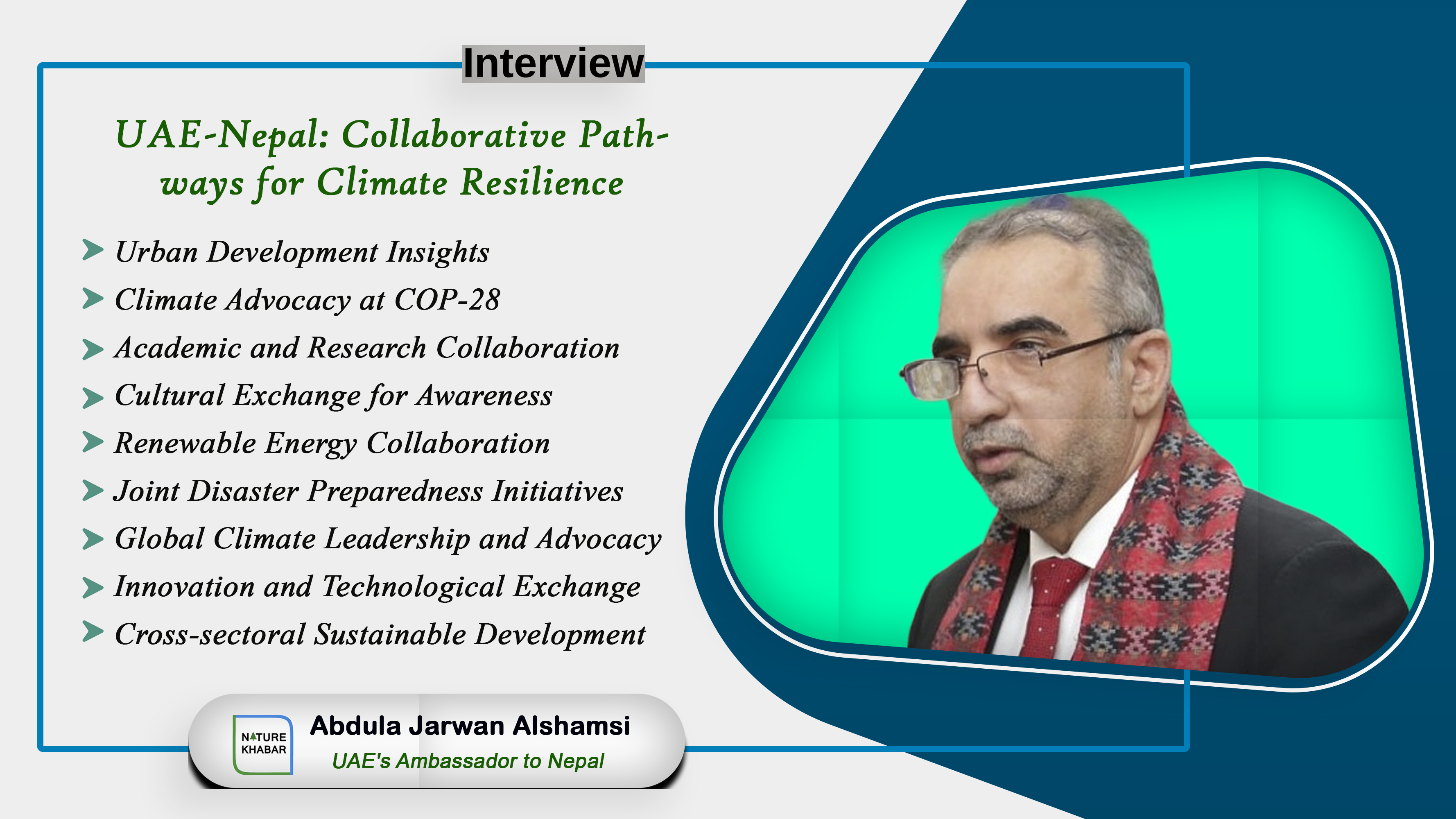

The 28th Conference of the Parties (COP-28), a significant global climate event, is set to take place in Dubai from November 14 to 26. As nations like Nepal prepare for this conference, Pitambar Sigdel of Nature Khabar sat down with UAE's Ambassador to Nepal, Abdullah Saeed Mubarak Jarwan Al Shamsi. They discussed Dubai's goals for the conference, Nepal's preparations, and the shared challenges of climate change.
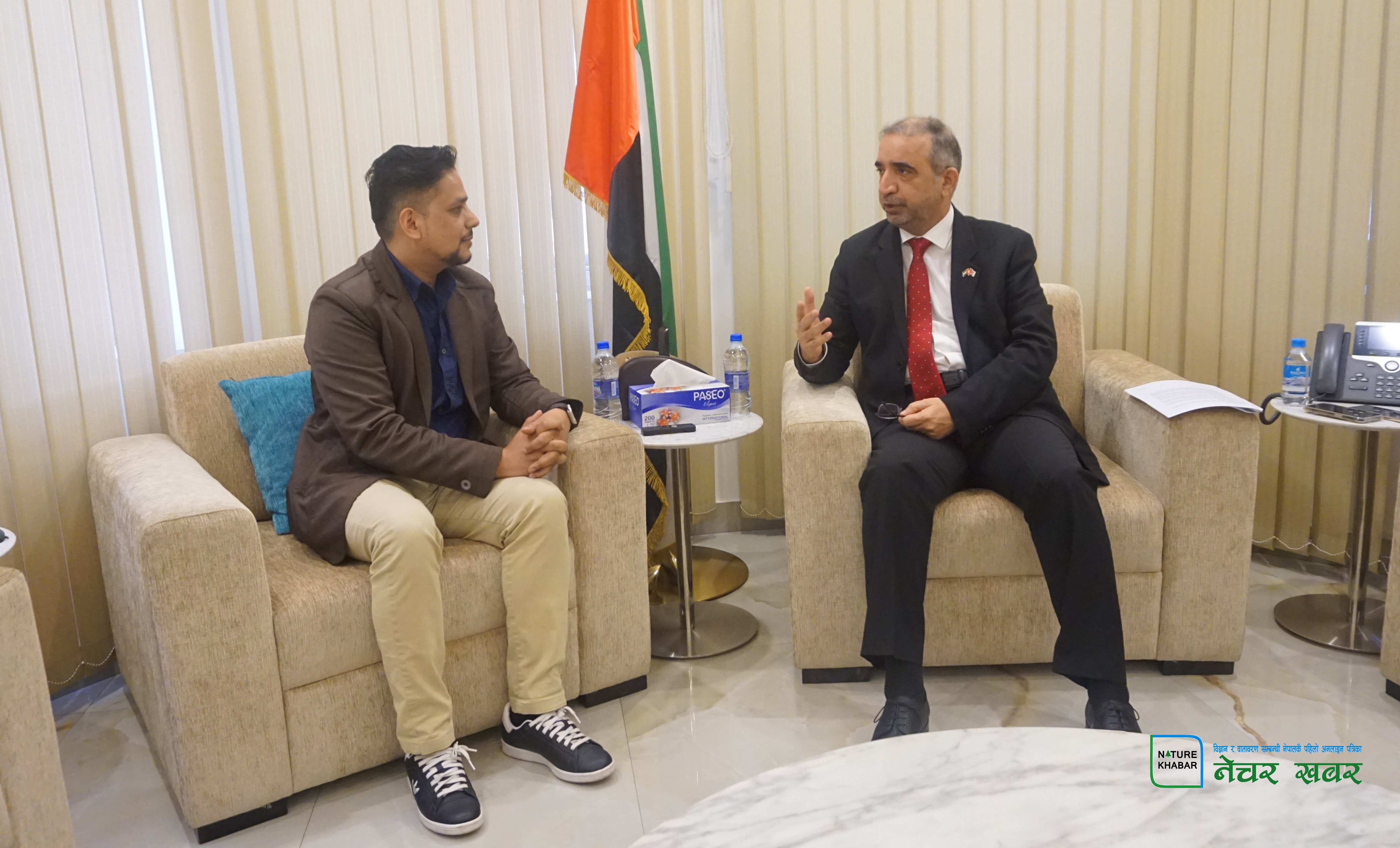
What are the UAE's primary objectives at COP-28 ?
Understanding the pivotal role COP-28 plays in the global battle against climate change, the UAE is determined to address pressing challenges and foster international collaboration. Here are the key goals the UAE aspires to achieve during this year's conference:
Heightening Ambition: Advocating for more stringent emissions reduction targets in sync with the Paris Agreement's aspirations.
Championing Innovation: Shedding light on the UAE's advancements in renewable energy and sustainable technologies.
Emphasizing Adaptation: Elevating the importance of building resilience and formulating strategies to handle the adverse effects of climate change.
Championing Nature: Giving prominence to solutions rooted in nature as effective climate mitigation methods.
Strengthening Global Ties: Seeking collaboration with diverse nations, international entities, and the private sector to fortify the fight against climate change.
Promoting Climate Finance: Bolstering financial support for climate-centric projects, particularly in nations that are still developing.
Mobilizing the Community: Invigorating the enthusiasm of the youth and the general public, fostering unity in the journey toward robust climate action.
Given its unique desert environment, how have the UAE's geographical and climatic conditions influenced its approach to environmental conservation and climate change mitigation ?
The desert climate of the UAE has guided its priorities, leading to innovative water management techniques, a pronounced focus on renewable energy, meticulous biodiversity conservation, and determined efforts against desertification. These conditions emphasize the importance of harmonizing development with environmental protection.
Can you shed light on the evolution of the UAE's stance on climate change ?
Transitioning from a primary emphasis on economic growth, the UAE has evolved to prioritize sustainability. This transformation is evident in its rise as a renewable energy frontrunner, the establishment of robust climate policies, and its active participation in global environmental dialogues.
What measures has the UAE implemented in terms of climate policies and initiatives ?
The UAE's strategy encompasses a broad spectrum of measures: expanding renewable energy infrastructures, adopting carbon capture technologies, championing sustainable urban planning, conserving the natural ecosystem, and devising strategies for climate adaptation.
How does the UAE perceive its role in global collaboration on climate change, especially with respect to partnerships or alliances formed during the COP28 conference, and what are the notable collaborations between the UAE and other entities in combatting climate change ?
The UAE envisions itself as a proactive player in the international climate change arena, actively contributing to and seeking partnerships for effective climate action. At events like COP28, the UAE focuses on enhancing its ties and forming new alliances to fortify collective efforts against climate change. Notable collaborations include hosting IRENA, pioneering sustainable initiatives like Masdar City, alliances with GGGI, participation in CEM, bilateral environmental agreements, and significant contributions to international climate funds. All these underline the UAE's unwavering commitment to global climate resilience and sustainable progress.
How does the UAE manage the juxtaposition of its swift economic progression, especially in areas like tourism and real estate, with its dedication to environmental sustainability ?
The UAE has methodically integrated sustainability into its economic blueprint. This includes implementing Green Building Standards like Estidama, pioneering sustainable urban projects such as Masdar City, launching the "Save Water" campaign for water conservation, and safeguarding biodiversity hotspots like Bu Tinah Island. The nation's approach is multifaceted, blending strategic alignment, economic diversification, prioritizing green infrastructure, imposing rigorous regulations, promoting public awareness, and investing heavily in innovative and renewable energy solutions. Collectively, these initiatives demonstrate how the UAE seamlessly intertwines booming sectors like tourism and real estate with its environmental pledges.
In what ways does the UAE engage its populace in its environmental endeavors? Are there any particularly impactful public campaigns or educational schemes ?
The UAE is proactive in involving its people in its environmental vision. Efforts span from widespread campaigns like "World’s Coolest Winter" and "Year of Tolerance" to specialized educational schemes such as the "Climate Change Ambassador" program for students. The nation also organizes community events like "Earth Hour" and uses digital platforms for wider outreach. Noteworthy events like World Expo 2020 further emphasize sustainable concepts, ensuring that the public is both informed and involved in the nation's environmental goals.
Can you elucidate the evolving relationship between the UAE and Nepal, particularly concerning environmental cooperation ?
Traditionally, the UAE-Nepal relationship was anchored in diplomacy and trade. However, recent years have witnessed a growing collaboration in environmental spheres, especially leading up to events like COP28. Both nations find common ground in renewable energy pursuits and fortifying climate resilience. While environmental collaboration might not be the primary thread binding them, it undoubtedly signifies their mutual resolve towards sustainability and navigating mutual ecological concerns.
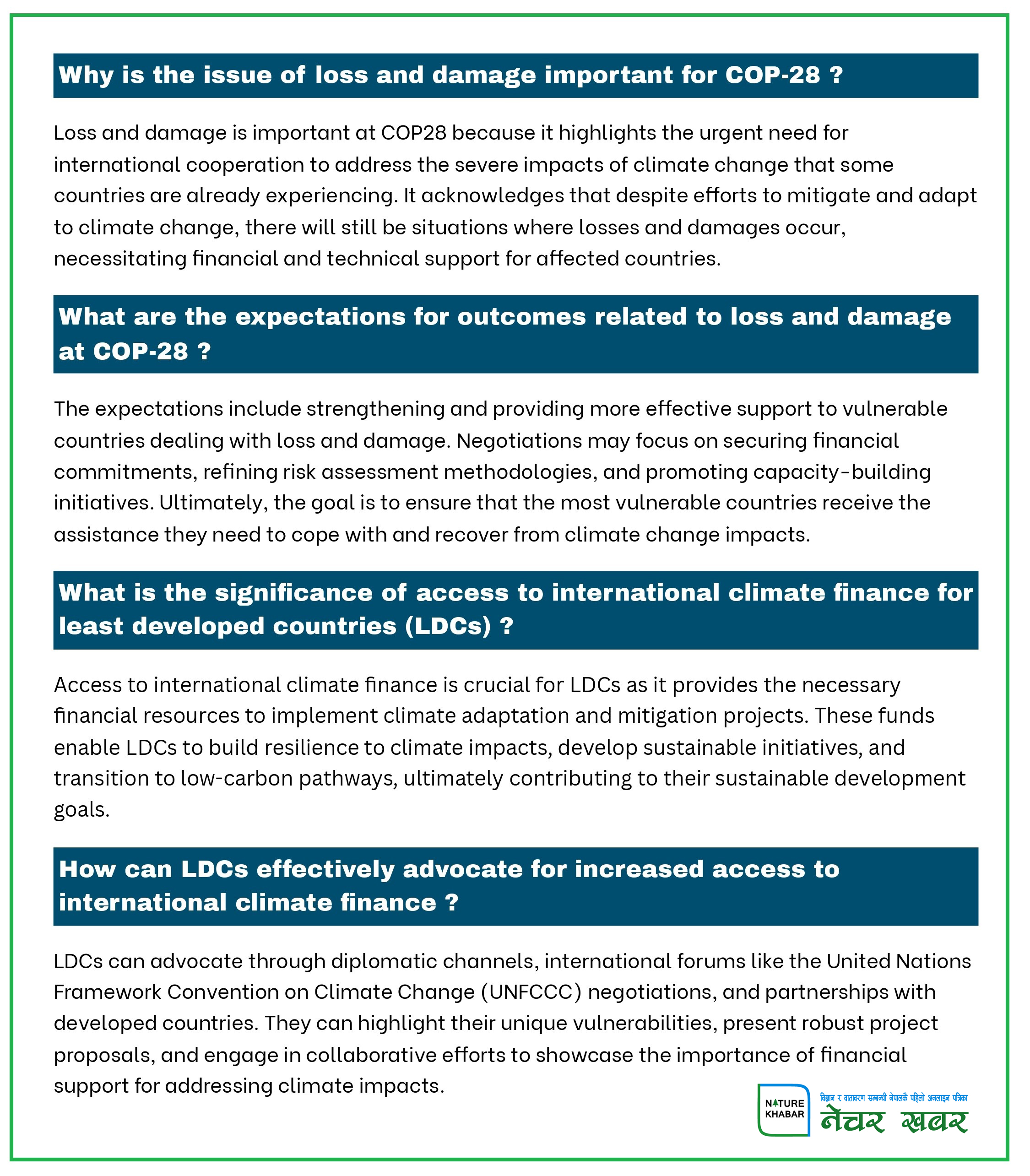
Both Nepal and the UAE have distinct environmental landscapes with Nepal's delicate mountain ecosystems and the UAE's arid desert regions. Are there mutual challenges or potentialities from which they can learn from one another ?
Indeed, while Nepal and the UAE boast contrasting terrains, they grapple with overlapping issues like water scarcity and the quest for climate resilience. Concurrently, they hold shared prospects in arenas such as renewable energy, biodiversity conservation, eco-tourism, and grassroots involvement. By exchanging insights and learnings, both nations can constructively address these intersecting concerns and harness shared opportunities, fostering mutual growth and eco-friendly progress.
With the UAE’s forward strides in renewable energy, especially solar power, are there avenues for partnership or expertise dissemination with Nepal, which is endowed with vast hydropower capabilities ?
The synergy between the UAE's strides in solar energy and Nepal's hydropower abundance creates an extensive canvas for cooperation. Here's a breakdown of potential areas of collaboration:
Technology Exchange: Nepal can integrate the UAE's advancements in solar tech and grid synergy to bolster the efficiency and reliability of its eco-friendly energy undertakings.
Policy and Regulatory Acumen: The UAE's successful blueprint in crafting conducive policies and regulatory backdrops for renewable energy proliferation could offer valuable lessons for Nepal.
Financial Ingenuity: The UAE's adeptness in luring private sector funds for green energy initiatives can provide Nepal with strategies to source capital for its hydropower projects.
Capacity Building: Mutual endeavors such as exchange programs, training modules, and tech symposia can amplify knowledge transfer, benefiting the renewable energy cohorts of both countries.
Research and Innovation: Collaborative R&D efforts could unearth avant-garde methodologies for green energy creation, storage, and holistic grid amalgamation.
In essence, the collaboration potential between Nepal and the UAE in the domain of renewable energy is immense. By tapping into each other's strengths and expertise, both nations can pave the path for sustainable progress, fortify energy autonomy, and play a pivotal role in the global crusade against climate adversity. It's pertinent to peruse contemporary sources to capture any novel developments or specific collaborative ventures in this realm.
With a significant populace of Nepali expatriates in the UAE, how might this cultural interchange be harnessed to amplify climate change and environmental preservation cognizance across both nations ?
The substantial cohort of Nepali expatriates in the UAE forms a robust conduit for fostering mutual environmental awareness and action:
Enlightening Workshops: Foster joint workshops and symposiums within the UAE's Nepali expat community. These can delve into topics like climate implications, green practices, and eco-conservation, orchestrated alongside local entities, educational hubs, and environmental aficionados.
Eco-themed Celebrations: Infuse traditional festivities and cultural soirees with themes of climate cognizance and eco-awareness, drawing in both the Nepali diaspora and the Emirati community. This melding can seamlessly fuse cultural joy with instructive undertones.
Bilingual Campaigns: Spearhead awareness drives that resonate with both the Nepali diaspora and the Emirati populace. Employ bilingual informational tools – from pamphlets to digital outreach – spotlighting climate repercussions and eco-conscious actions.
Academic Engagements: Partner with academic establishments to weave environmental themes into academic modules, engaging students spanning diverse nationalities and backgrounds.
Unified Clean-Up Initiatives: Rally both Nepali expatriates and Emiratis for communal clean-up crusades, imbuing a collective sense of environmental guardianship and communal solidarity.
Afforestation Drives: Propel tree-planting movements with active participation from both communities, fostering both ecological restoration and communal unity.
Creative Eco-Expressions: Host art expos and cultural performances, letting them narrate tales of environmental conservation and climate imperatives, harnessing the emotive power of the arts.
Narratives of Nature: Facilitate platforms for Nepali expatriates to narrate their personal trysts with environmental shifts and conservation endeavors. Such first-hand tales can evoke empathy, spark discussions, and galvanize eco-action.
Harnessing this rich cultural tapestry, both nations can foster an environmental renaissance, drawing from shared experiences, values, and aspirations for a greener future.
How can the expertise of the UAE in sustainable urban development assist Nepal, especially considering the urbanization issues Nepal confronts ?
Nepal stands to gain significantly from the UAE's acumen in sustainable urban development, given its urbanization challenges:
Urban Planning Models: Nepal can adopt and adapt the UAE's master plans that integrate sustainability, efficient resource usage, and urban resilience.
Infrastructure Development: The UAE’s experience in creating energy-efficient buildings, transportation networks, and other infrastructures can guide Nepal in its urban development endeavors.
Waste Management Solutions: Learning from the UAE's advanced waste treatment and recycling mechanisms can help Nepal address its growing waste concerns amidst urbanization.
Water Management: Emulating the UAE's expertise in water conservation, desalination, and wastewater treatment can benefit Nepal's urban centers facing water scarcity or management issues.
Smart City Technologies: The UAE's progress in integrating technology into urban governance can offer Nepal insights into enhancing city management, transportation, and utilities through tech-driven solutions.
At events such as COP 28, how can Nepal and the UAE synergize to accentuate each other’s climatic concerns, given their regions' susceptibility to climatic ramifications ?
By consolidating efforts, Nepal and the UAE can champion their shared climatic vulnerabilities at global platforms like COP28:
Consistent Advocacy: A coordinated stance on critical climate topics can accentuate their concerns and catalyze collective action.
Data-driven Dialogues: Mutual exchange of data and research deepens the gravity of their concerns, demonstrating the tangible impacts of climate change in their regions.
Alliance Formations: Collaborative alliances with other climatically-sensitive nations can elevate their collective bargaining power.
Success Narratives: Profiling their triumphs in climate resilience and mitigation amplifies the narrative of proactive, localized solutions.
Diverse Collaboration: Uniting various stakeholders from civil society, businesses, and academia, enhances their advocacy breadth and depth.
Platform Utilization: Hosting shared events or panels enriches the dialogue around shared climatic experiences and solutions.
All-encompassing Partnerships: Engaging globally with varied institutions reinforces their positions and broadens their impact.
Are there vistas for academic and scholarly synergy between Nepali and Emirati institutions, specifically within environmental domains ?
A: Multiple avenues exist for academic and research bonds between Nepal and the UAE in environmental disciplines:
Collaborative Inquiries: Joint research endeavors can explore localized climatic effects and shape context-specific mitigation tactics.
Scholarly Exchanges: Facilitating cross-country academic experiences promotes mutual learning and fosters cross-cultural understanding.
Adaptive Strategies: Research can focus on crafting strategies that enhance adaptability to climatic changes, preparing communities for foreseeable challenges.
Eco-tech Collaborations: Shared studies on sustainable technologies can fast-track their adoption and adaptability in both nations.
Educative Initiatives: Focused efforts in climatic education can uplift societal cognizance and inspire proactive green behaviors.
Governance and Policy Studies: Joint studies can evaluate and refine policy frameworks, shaping more robust, evidence-based climate policies.
Integrated Environmental Studies: Merging expertise in diverse environmental facets can sculpt comprehensive solutions for shared challenges, from urbanization to conservation.
might the environmental alliance between Nepal and the UAE shape up in the coming years? What sectors could dominate this collaboration ?
The environmental bond between Nepal and the UAE offers rich potential for deepening synergies and crafting transformative eco-initiatives:
Agricultural Modernization: With the UAE's advancements in agri-tech and Nepal's diverse agricultural landscape, a partnership can focus on sustainable agriculture, addressing food security and promoting eco-friendly farming techniques.
Tourism and Conservation: The UAE's expertise in sustainable tourism can benefit Nepal, one of the world's biodiversity hotspots. They can work together on eco-tourism projects that value and conserve the natural environment.
Green Financing: With the UAE’s growing emphasis on green investments, there's potential for financial collaboration to fund sustainable projects in Nepal.
Digital Climate Solutions: Embracing digital solutions for climate monitoring, forecasting, and management can be a vital area of collaboration, given the UAE’s tech-driven approach and Nepal's need for such tools.
Water Management Collaboration: The UAE's innovations in water management can be invaluable to Nepal, especially for irrigation, drinking water supply, and flood management.
With the UAE's journey in addressing climate change, what counsel would you offer to nations facing similar environmental dynamics?
The UAE's climate journey offers a plethora of insights for nations traversing similar environmental landscapes:
Strategic Vision: Embrace a forward-thinking, holistic vision that integrates environmental sustainability across all sectors.
Stakeholder Engagement: Foster collaborations with private sectors, non-governmental entities, and civil society for a unified approach.
Infrastructure Resilience: Prioritize constructing resilient infrastructures, especially in areas prone to climate-induced risks.
Adaptive Governance: Regulatory frameworks must be adaptive, allowing for recalibration based on changing climate scenarios and technological advancements.
Desert Ecosystems Preservation: Countries with arid regions can emulate the UAE's efforts in desert preservation, combating desertification, and promoting sustainable land use.
Water Conservation: For nations with water scarcity, the UAE's water conservation and desalination techniques can be invaluable.
Circular Economy Emphasis: Advocate for a circular economy to reduce waste and promote recycling, especially in fast-growing urban regions.
Public Mobilization: Harness the power of citizens by instilling environmental consciousness through education and outreach programs.
Sustained Investments: Continuous investments in research, technology, and sustainable industries are crucial to drive long-lasting positive change.

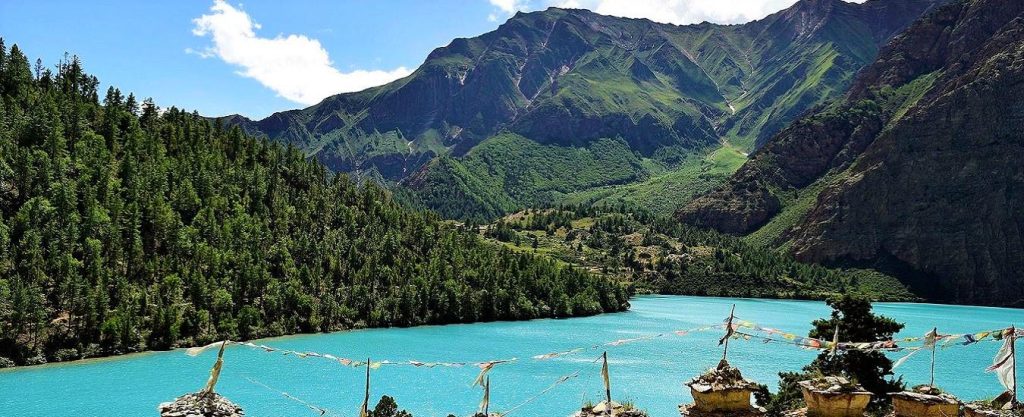
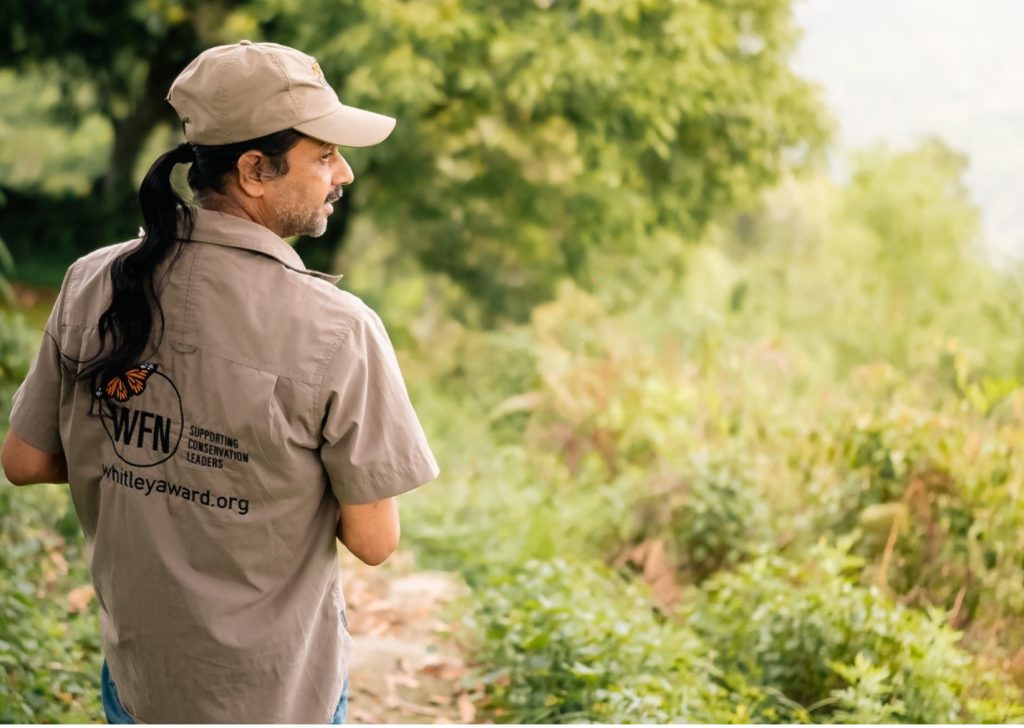
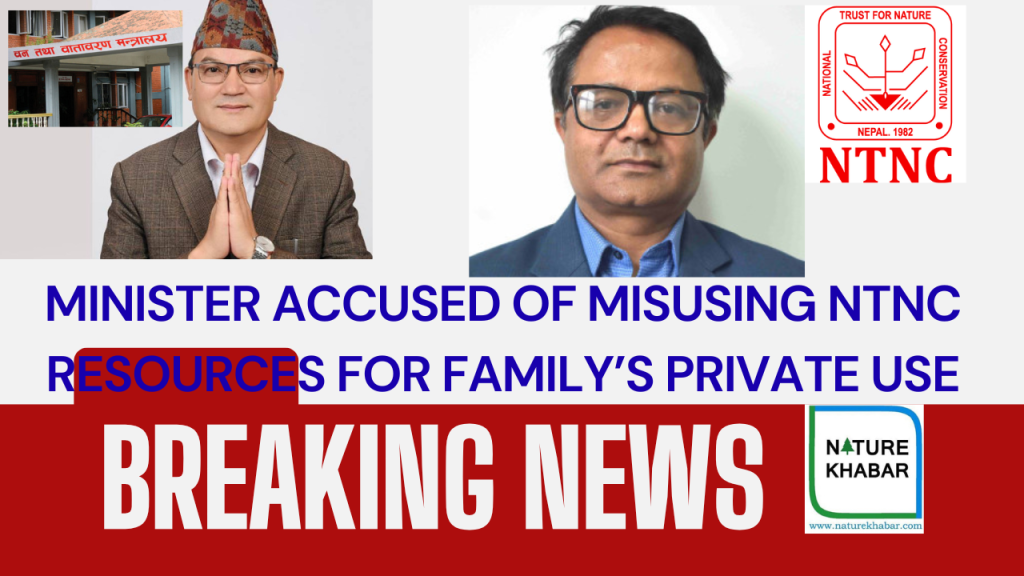

Feedback